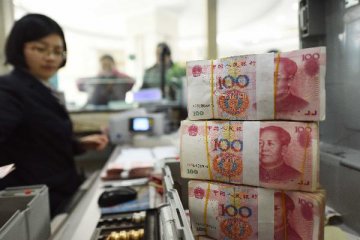China’s first government takeover of a bank in more than two decades jolted the country’s financial sector on Monday, driving up funding costs and underscoring the potential for increased stress at regional lenders that piled into off-book financing in recent years.
Interbank rates jumped after regulators said late Friday that they would assume control of Baoshang Bank Co. for one year because of “serious” credit risks. While authorities said they would guarantee smaller deposits, they left markets guessing over which of the Inner Mongolia-based lender’s other creditors might face losses.
Baoshang, once seen as a model for funding regional economies, is one of many smaller Chinese lenders that obscured its exposure to risky borrowers by tapping into the country’s shadow-financing system, according to analysts. China has been cracking down on such behavior, but UBS Group AG analyst Jason Bedford said the country is rife with regional banks that used special-purpose vehicles to circumvent lending restrictions and hide the true state of their bad loans.
The Baoshang takeover highlights the difficult balancing act faced by Chinese regulators as they try to clean up risky lending practices without triggering a loss of faith in banks that might damage the world’s second-largest economy amid a trade war with America. Shares of big, state-owned Chinese lenders may be vulnerable on concern they’ll be asked to help resolve problems at smaller peers, according to Sanford C. Bernstein.
Baoshang was part of the investment conglomerate led by financier Xiao Jianhua, known as the Tomorrow Group, which is being probed by Chinese officials, according to two people familiar with the investigation.
Officials arranged for a Shenzhen state-owned investment company to buy a significant stake in Baoshang last year, then realized that the lender’s financial situation was more precarious than previously thought, the people said, asking not to be named as they’re not authorized to talk to media. The deal didn’t go through and regulators were forced to take over the bank instead, according to the people.
Xiao, who disappeared in early 2017, could soon face trial, the people said.
The People’s Bank of China and China Banking and Insurance Regulatory Commission didn’t immediately respond to requests for comment.
Regional banks in China’s rust belt drove the rapid expansion of non-traditional lending that peaked in early 2018.
Some banks are now getting squeezed as Chinese companies default at a record pace and financing costs for shadow-lending activities increase. As part of the government clampdown, banks have been forced to reclassify loans overdue for more than 90 days as non-performing, a move that led to a record surge in soured debt.
China Construction Bank Corp., the nation’s second-largest lender, will be responsible for managing Baoshang’s business while it’s under government control, regulators said on Friday.
Founded in 1998, Baoshang has more than 8,000 staff and reported total assets of 576 billion yuan ($83 billion) at the end of September 2017. The smaller bank’s so-called investment receivables, which analysts have said are often loans disguised as investments, stood at 153 billion yuan, accounting for more than a quarter of total assets.
Baoshang has more than 60 billion yuan of negotiable certificates of deposit and 6.5 billion yuan of subordinated bonds outstanding, according to data compiled by Bloomberg. Trading in the company’s NCDs and other bonds was suspended on Monday, people familiar with the matter said.
Friday’s announcement will put shares of other Chinese banks under pressure, according to Sanford C. Bernstein.
“Low quality, small regional banks are unlikely to pose systematic risks to the financial system or the operations of the big SOE and joint stock banks,” analysts Linda Sun-Mattison and Jason Li wrote in a note on Monday. “However, the bail out of Baoshang Bank, a rare move by the government, and the involvement of CCB will no doubt heighten investor concerns over SOE banks’ risk exposure to national service.”
Source: Bloomberg




















Latest comments